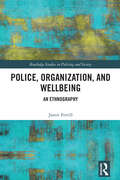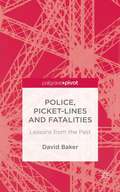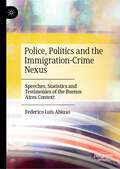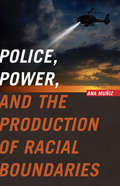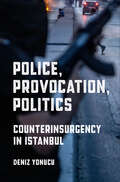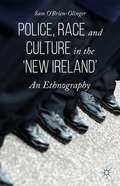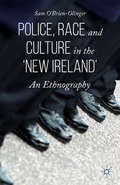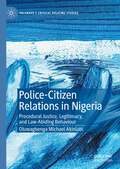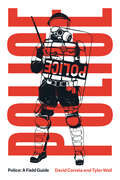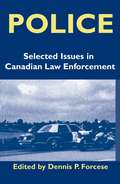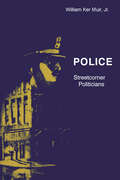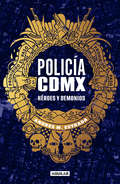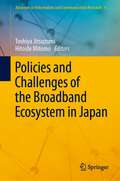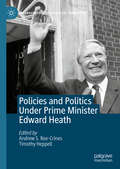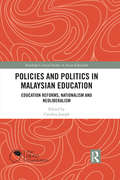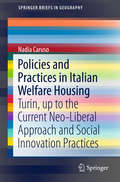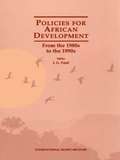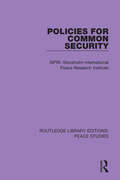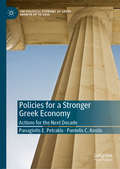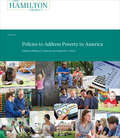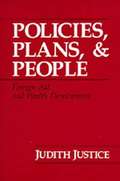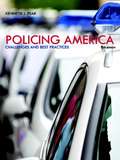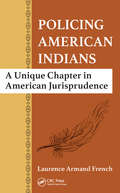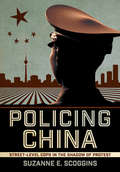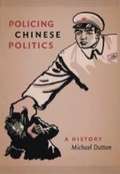- Table View
- List View
Police, Organization, and Wellbeing: An Ethnography (Routledge Studies in Policing and Society)
by Jamie FerrillBased on the study of a police organization in England, this book explores the role of social relations in the ways that people construct, mobilize, consume, and reconstruct meaning about wellbeing. Wellbeing is a powerful, institutionalized concept in police organizations across England and Wales. With the emergence of numerous policies, strategies, and practices that both explicitly and implicitly address wellbeing in the workplace, the concept has come to feature prominently. Wellbeing is addressed as an issue that needs to be understood intersubjectively by attending to the underlying social issues that shape how it is promoted or denied. After a theoretical exploration of police culture and wellbeing, the book traverses ethnographic data and captures insights from individuals across the organization’s hierarchy. It explores what individuals perceive wellbeing to mean and how they make sense of the concept. The book reveals discernible ideological-laden tensions across the hierarchy in terms of wellbeing constructions. By exploring these tensions, there is a potential to understand the constructions of wellbeing and the resultant implications for practice. This book will be of interest to academics, researchers, and students in policing, criminology, criminal justice, leadership/management, organizational behaviour, and wellbeing. Given its empirical focus and applicability to practitioners, it will also be of interest to a range of non-academics, including police officers and leaders, public servants, private organizations, policymakers, and human resources professionals.
Police, Picket-Lines and Fatalities: Lessons from the Past
by David BakerBaker explores public protests and their management by the police, focusing on the fatalities of strikers at the hands of police and outlining practices towards preventing such tragedies.
Police, Politics and the Immigration-Crime Nexus: Speeches, Statistics and Testimonies of the Buenos Aires Context
by Federico Luis AbiusoThis book examines the relationship between immigration, crime, police and politics in the city of Buenos Aires during the Cambiemos ("Let's Change") administration, which took place in Argentina between 2015 and 2019. It draws on semi-structured interviews with migrants to offer insights into interactions between police and migrants, narratives of police violence, police attitudes towards migrants, the nexus between police and politics and the perception of the vulnerability of the migratory community of belonging to police action. Using a mixed methods approach, it also draws on secondary quantitative data regarding police practices of detention of migrants and examines political discourses around the immigration-crime association. In essence, it discusses the changes in attitude of the police towards different ethnic-national groups during the administration Cambiemos. In this sense, it presents empirical research and methodological insights from the Global South.
Police, Power, and the Production of Racial Boundaries
by Ana MuñizBased on five years of ethnography, archival research, census data analysis, and interviews, Police, Power, and the Production of Racial Boundaries reveals how the LAPD, city prosecutors, and business owners struggled to control who should be considered "dangerous" and how they should be policed in Los Angeles. Sociologist Ana Muñiz shows how these influential groups used policies and everyday procedures to criminalize behaviors commonly associated with blacks and Latinos and to promote an exceedingly aggressive form of policing. Muñiz illuminates the degree to which the definitions of "gangs" and "deviants" are politically constructed labels born of public policy and court decisions, offering an innovative look at the process of criminalization and underscoring the ways in which a politically powerful coalition can define deviant behavior. As she does so, Muñiz also highlights the various grassroots challenges to such policies and the efforts to call attention to their racist effects. Muñiz describes the fight over two very different methods of policing: community policing (in which the police and the community work together) and the "broken windows" or "zero tolerance" approach (which aggressively polices minor infractions--such as loitering--to deter more serious crime). Police, Power, and the Production of Racial Boundaries also explores the history of the area to explain how Cadillac-Corning became viewed by outsiders as a "violent neighborhood" and how the city's first gang injunction--a restraining order aimed at alleged gang members--solidified this negative image. As a result, Muñiz shows, Cadillac-Corning and other sections became a test site for repressive practices that eventually spread to the rest of the city.
Police, Provocation, Politics: Counterinsurgency in Istanbul (Police/Worlds: Studies in Security, Crime, and Governance)
by Deniz YonucuIn Police, Provocation, Politics, Deniz Yonucu presents a counterintuitive analysis of contemporary policing practices, focusing particular attention on the incitement of counterviolence, perpetual conflict, and ethnosectarian discord by the state security apparatus. Situating Turkish policing within a global context and combining archival work and oral history narratives with ethnographic research, Yonucu demonstrates how counterinsurgency strategies from the Cold War and decolonial eras continue to inform contemporary urban policing in Istanbul. Shedding light on counterinsurgency's affect-and-emotion-generating divisive techniques and urban dimensions, Yonucu shows how counterinsurgent policing strategies work to intervene in the organization of political dissent in a way that both counters existing alignments among dissident populations and prevents emergent ones. Yonucu suggests that in the places where racialized and dissident populations live, provocations of counterviolence and conflict by state security agents as well as their containment of both cannot be considered disruptions of social order. Instead, they can only be conceptualized as forms of governance and policing designed to manage actual or potential rebellious populations.
Police, Race and Culture in the 'New Ireland': An Ethnography
by Sam O'Brien-OlingerPolice, Race and Culture in the 'New Ireland'.
Police, Race and Culture in the 'new Ireland': An Ethnography
by Sam O'Brien-OlingerThis book explores the relationship between the Irish police and ethnic minorities, made particularly pressing by the rapid ethnic diversification of Irish society. It addresses the current deficit in knowledge of this area by exploring how Irish police officers conceive of, talk about, and interact with Ireland's immigrant minority communities.
Police-Citizen Relations in Nigeria: Procedural Justice, Legitimacy, and Law-Abiding Behaviour (Palgrave's Critical Policing Studies)
by Oluwagbenga Michael AkinlabiThis book offers an historical and contemporary analysis of policing and police-citizen relations in Nigeria, to understand why people co-operate (or don’t) with the police. It examines police legitimacy and the validity of procedural justice theory in a post-colonial African context where corruption, brutality and lack of accountability are not uncommon, to find more refined and alternative answers to the question of why people co-operate (or don’t) with the police. The history of policing in Nigeria is explored first and then procedural justice theory is tested through an extensive, cross-sectional survey of the public. One of the core findings is that citizens’ co-operation with the police is driven less by legitimacy but more by effectiveness considerations and “dull compulsion”, a concept akin to legal cynicism. This study represents one of the first attempts to test and understand “dull compulsion” and its relevance in this context. Overall, it develops the field by illustrating that that there are significant variations between contexts when addressing the influence of perceived procedural justice policing on perceptions of police legitimacy, and it explains the implications for policy makers.
Police: A Field Guide
by David Correia Tyler WallIt doesn’t take firsthand experience to learn the meaning of pain compliance or rough ride. Police: A Field Guide is an illustrated handbook to the methods, mythologies, and history that animate today’s police. It is a survival manual for encounters with cops and police logic, whether it arrives in the shape of officer friendly, Tasers, curfews, non-compliance, or reformist discourses about so-called bad apples. In a series of short chapters, each focusing on a single term, such as the beat, order, badge, throw-down weapon, and much more, authors David Correia and Tyler Wall present a guide that reinvents and demystifies the language of policing in order to better prepare activists—and anyone with an open mind—on one of the key issues of our time: police brutality. In doing so, they begin to chart a future free of this violence—and of police.
Police: Current Issues in Canadian Law Enforcement
by Dennis P. ForceseNot a day goes by in which the police do not figure prominently in the news. Whether it be as investigators of a rural homicide, or as the subjects of a debate on police chases, the police are ever-present. They are news. The public’s fear of crime and the "law and order" agenda prominently advanced by many politicians make Police a particularly topical collection of original essays that examine developments and issues of public concern relating to Canada’s municipal police. These essays address such issues of public debate as police regionalization, the role and militancy of police unions, the proliferating use of police tactical units, facts and fictions of community policing, stress symptoms such as divorce among serving police officers, and the role and career prospects of women in policing.
Police: Streetcorner Politicians
by William K. Muir Jr."This book . . . examines the problem of police corruption . . . in such a way that the stereotype of the crude, greedy cop who is basically a grown-up delinquent, if not an out-and-out robber, yields to portraits of particular men, often of earnest good will and even more than ordinary compassion, contending with an enormously demanding and challenging job."—Robert Coles, New Yorker "Other social scientists have observed policemen on patrol, or have interviewed them systematically. Professor Muir has brought the two together, and, because of the philosophical depth he brings to his commentaries, he has lifted the sociology of the police on to a new level. He has both observed the men and talked with them at length about their personal lives, their conceptions of society and of the place of criminals within it. His ambition is to define the good policeman and to explain his development, but his achievement is to illuminate the philosophical and occupational maturation of patrol officers in 'Laconia' (a pseudonym) . . . . His discussions of [the policemen's] moral development are threaded through with analytically suggestive formulations that bespeak a wisdom very rarely encountered in reports of sociological research."—Michael Banton, Times Literary Supplement
Policia CDMX: Héroes y demonios
by Andrés M. EstradaHablar de la policía de la Ciudad de México es hablar de una institución de claroscuros. Escándalos, violaciones, sobornos y corruptelas se tejen al interior de esta policía junto con elementos realmente valiosos para la sociedad capitalina. Este libro da voz, mediante una profunda investigación, a quienes han vivido estas contradicciones para bien y para mal. La ferozcorrupción interna; el cobijo de ciertos mandos hacia grupos delincuenciales; el acoso sexual que sufren las mujeres policías; la fabricación de delitos y su negocio redondo; la precariedad de los sueldos, y un largo etcétera. Pero a la par, y más allá del estigma que recae sobre el policía de a pie, hay verdaderos héroes que arriesgan la vida en las calles y no obtienen más que el anonimato y unas cuantas balas zumbando sobre sus cabezas. Las historias aquí vertidas atestiguan que verdaderos héroes y demonios conviven en dicha institución.
Policies and Challenges of the Broadband Ecosystem in Japan (Advances in Information and Communication Research #4)
by Hitoshi Mitomo Toshiya JitsuzumiThis book shows how telecom, broadcast, and Internet researchers as well as experts from Japan's leading mobile operators interpret, analyze, and evaluate the emerging phenomenon of the Japanese broadband ecosystem. The broadband ecosystem, as it rapidly changes against the backdrop of swift technological progress, is forcing major changes in the existing socioeconomic framework and generating many policy issues that require discussion.The book aims to provide a theoretical and practical framework for policymakers to address these issues from a broader perspective than has been available in the past. The topics addressed in this book cover sharing of 5G infrastructure, online platform regulation, diffusion of autonomous driving, content industry, trends and use cases of 5G, capacity development for AI, ride-hailing service, smartphone games, the right to be forgotten, and the economic value of personal information.Although this book cannot provide definitive answers to all these recently emerging and rapidly changing issues, it does provide important guidance for evidence-based discussion involving policymakers and researchers working on these issues. It is also recommended for graduate students who want to enter this challenging field of policy discussion.
Policies and Politics Under Prime Minister Edward Heath (Palgrave Studies in Political Leadership)
by Timothy Heppell Andrew S. Roe-CrinesThis book explores the political and intellectual significance of Edward Heath’s leadership of the Conservative Party. It contains a series of original and distinctive chapters that feature extensive archival materials and original insights from leading political scientists and historians. The volume contributes significantly to our understanding of Conservative Party politics, leadership, and conservatism more broadly.
Policies and Politics in Malaysian Education: Education Reforms, Nationalism and Neoliberalism (Routledge Critical Studies in Asian Education)
by Cynthia JosephThis book draws on elements of critical social theory, research on globalization, neo liberalism and education, and Malaysian Studies to understand the interplay of globalization, nationalism, cultural politics and ethnicized neoliberalism in shaping the educational reforms in Malaysia. Using the Malaysia Education Blueprint 2013-2025 (MEB) as a case study, a catalyst and a context, this collection critically explores some of the complex historical and contemporary push-pull politics and factors shaping Malaysia’s education system, its reform and the experience of Malaysians – and others – within it. The authors in this volume focus on the interplay of neoliberalism, nationalism, ethnic and cultural politics in shaping the educational reforms in Malaysia. Their work captures and seeks to understand the enduring, though changing, hierarchy of access and differentiated rights to educational, social and economic resources and opportunities experienced by different individuals and collectives, including those involved in the neoliberal enterprise of international education. It looks at how inequities have been re-configured in different educational spaces in Malaysia, and at how these inequities have been addressed through reform policies and practices. The book will be a shaper and critical contributor to the assessment of the Malaysian Education Blueprint and related policies. It will also have wider relevance globally as a critical approach to policy discussion.
Policies and Practices in Italian Welfare Housing
by Nadia CarusoThis book offers a European perspective on urban planning and spatial design by outlining housing policies in Southern Europe and their evolution. Through a unique case study on the city of Turin it explores social innovation and the relationship between the urban regeneration process and housing practices. The case study is a useful example in the debate about changing welfare arrangements in Europe and the emerging rhetoric of social innovation in housing. The book encourages debate about the tools needed to address housing needs, exploring current practices. Chapters look at the spatial dimension of housing, the financial mechanisms put in place, the actors involved in the field (public authorities, ethical investors, tertiary sector, inhabitants and locals. ) The case study of the metropolitan city of Turin demonstrates complex housing needs and the innovative character of public and private solutions. As this book combines theory and practice, it appeals to both academics and practitioners. It is especially be of interest to spatial planners, geographers and social scientists interested in housing policies, and those interested in the Italian context of the case study.
Policies for Common Security (Routledge Library Editions: Peace Studies)
by Stockholm International Peace Research Institute (SIPRI)The basic idea of common security is not complex. It is that no country can obtain security, in the long run, simply by taking unilateral decisions about its own military forces. This is because security depends also on the actions and reactions of potential adversaries. Security has to be found in common with those adversaries. These ideas were considered in a SIPRI conference held in 1983. The conference had two main objectives. The first was to undertake a critical examination of the concept. The second was to consider the implications of the idea for policy in general, and for disarmament and arms control policy in particular. Originally published in 1985, this book contains revised versions of some of the papers presented at the conference.
Policies for a Stronger Greek Economy: Actions for the Next Decade (The Political Economy of Greek Growth up to 2030)
by Panagiotis E. Petrakis Pantelis C. KostisThis book presents a comprehensive economic plan for Greece to encourage growth and avoid future crises. This book emphasizes structural reforms and the rational financial management and analysis of private and investment infrastructures. This book also looks at the country's production and places an emphasis on revitalizing its technological structure. The analysis in this book includes policy implementation (in the short-, medium- and long-term) across important topics such as sustainability, inclusivity, pro-growth social behavior, and dynamic economic growth. This book takes an evolutionary economics perspective, looking at important structures throughout society like governance, political functioning, cultural attitudes, and growth. With its comprehensive approach, this book is crucial reading for scholars and policymakers interested in the Greek economy.
Policies to Address Poverty in America
by Melissa S. Kearney Benjamin H. HarrisOne-in-seven adults and one-in-five children in the United States live in poverty. Individuals and families living in poverty not only lack basic, material necessities, but they are also disproportionally afflicted by many social and economic challenges. Some of these challenges include the increased possibility of an unstable home situation, inadequate education opportunities at all levels, and a high chance of crime and victimization. Given this growing social, economic, and political concern, The Hamilton Project at Brookings asked academic experts to develop policy proposals confronting the various challenges of America's poorest citizens, and to introduce innovative approaches to addressing poverty. When combined, the scope and impact of these proposals has the potential to vastly improve the lives of the poor. The resulting 14 policy memos are included in The Hamilton Project's Policies to Address Poverty in America. The main areas of focus include promoting early childhood development, supporting disadvantaged youth, building worker skills, and improving safety net and work support.
Policies, Plans, and People: Foreign Aid and Health Development
by Judith JusticeJudith Justice uses an interdisciplinary approach to show how anthropologists and planners can combine their expertise to make health care programs culturally compatible with the populations they serve.
Policing America: Challenges and Best Practices (Eighth Edition)
by Kenneth J. PeakPolicing America: Challenges and Best Practices, 8e, offers a problem-solving approach that emphasizes what is actually working in the field. Based on the author’s thirty-plus years of practical policing and academic experience, this eighth edition continues to be set apart by its traditional, applied, “what works” theme. That, coupled with comprehensive updates throughout and the minor restructuring of this edition, provide an approach not otherwise found on the market. Emphases are on topics of major, national importance and interest, such as terrorism, personnel issues, community policing, investigations, rule of law, accountability (ethics, liability), patrol, and technologies. Organized to flow smoothly for the instructor and student, this edition continues to provide a penetrating view of one of the most difficult and challenging occupations in America: policing!
Policing American Indians: A Unique Chapter in American Jurisprudence
by Laurence Armand FrenchBias, prejudice, and corruption riddle the history of US jurisprudence. Policing American Indians: A Unique Chapter in American Jurisprudence explores these injustices, specifically the treatment of American Indians. A mix of academic research as well as field experience, this book draws on author Laurence French‘s more than 40 years of experience
Policing China: Street-Level Cops in the Shadow of Protest (Studies of the Weatherhead East Asian Institute, Columbia University)
by Suzanne E. ScogginsIn Policing China, Suzanne E. Scoggins delves into the paradox of China's self-projection of a strong security state while having a weak police bureaucracy. Assessing the problems of resources, enforcement, and oversight that beset the police, outside of cracking down on political protests, Scoggins finds that the central government and the Ministry of Public Security have prioritized "stability maintenance" (weiwen) to the detriment of nearly every aspect of policing. The result, she argues, is a hollowed out and ineffective police force that struggles to deal with everyday crime.Using interviews with police officers up and down the hierarchy, as well as station data, news reports, and social media postings, Scoggins probes the challenges faced by ground-level officers and their superiors at the Ministry of Public Security as they attempt to do their jobs in the face of funding limitations, reform challenges, and structural issues. Policing China concludes that despite the social control exerted by China's powerful bureaucracies, security failures at the street level have undermined Chinese citizens' trust in the legitimacy of the police and the capabilities of the state.
Policing Chinese Politics: A History
by Michael DuttonBeginning with the bloody communist purges of the Jiangxi era of the late 1920s and early 1930s and moving forward to the wild excesses of the Cultural Revolution, Policing Chinese Politics explores the question of revolutionary violence and the political passion that propels it. "Who are our enemies, who are our friends, that is a question germane to the revolution," wrote Mao Zedong in 1926. Michael Dutton shows just how powerful this one line was to become. It would establish the binary division of life in revolutionary China and lead to both passionate commitment and revolutionary excess. The political history of revolutionary China, he argues, is largely framed by the attempts of Mao and the Party to harness these passions.The economic reform period that followed Mao Zedong's rule contained a hint as to how the magic spell of political faith and commitment could be broken, but the cost of such disenchantment was considerable. This detailed, empirical tale of Chinese socialist policing is, therefore, more than simply a police story. It is a parable that offers a cogent analysis of Chinese politics generally while radically redrafting our understanding of what politics is all about. Breaking away from the traditional elite modes of political analysis that focus on personalities, factions, and betrayals, and from "rational" accounts of politics and government, Dutton provides a highly original understanding of the far-reaching consequences of acts of faith and commitment in the realm of politics.
